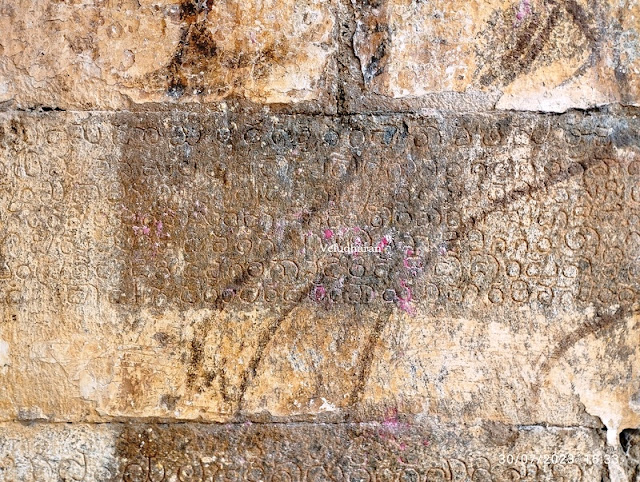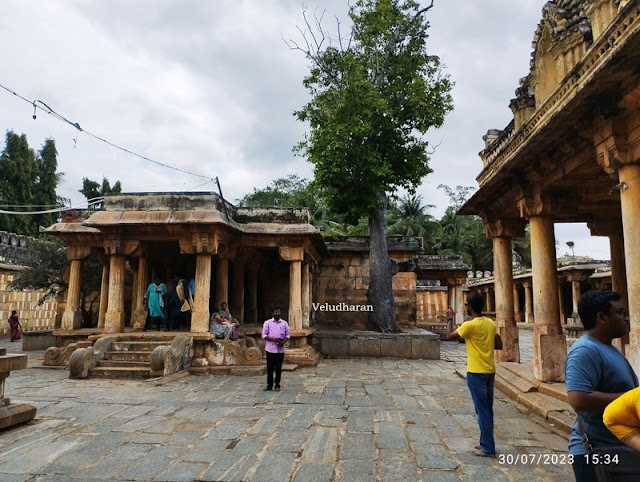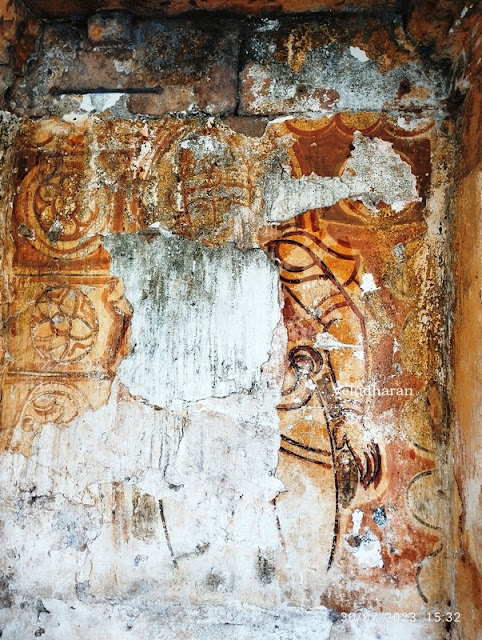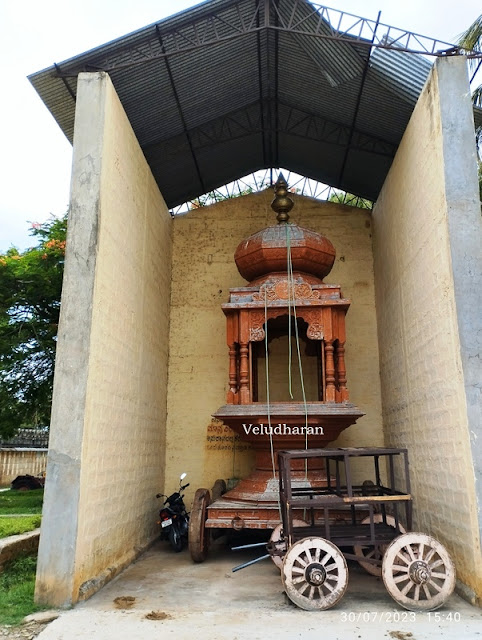The
Visit to this Thondanoor Shri Venugopala Swamy
Temple, was a part of “Karnataka State, Hoysala Period Shiva and temple’s
visit”- on 30th July 2023, organised by தொண்டை மண்டல வரலாற்று ஆய்வு சங்கம் "திருக்கச்சி" FB
Group. This place is now called as Thonnur. Moolavar Shri Venugopala swamy is also called
as Parthasarathy and this place is now called as Thonnur.
Moolavar : Shri Venugopala Swamy
Consorts : Shri Satyabhama and Rukmini
Some
of the salient features of this temple are….
The
temple is facing east with an entrance from east side. A mandapam is on the
right side after the entrance. A balipeedam is in front of the temple. Vijayanagara
period paintings are on both side of the entrance to the sanctum sanctorum. Moolavar
Sri Venugopalaswamy in the sanctum sanctorum is in standing posture with
Satyabhama and Rukmini. Utsavars are in front of the moolavar. There is no
sannidhi for Thayar.
A
Chitramezhi kalvettu is in front of the temple compound wall. ( a separate post
is written on this )
ARCHITECTURE
The
temple consists of sanctum sanctorum, antarala / sukhanasi, Navaranga mandapam
and Maha mandapam. The Sanctum sanctorum
is on the padabandha adhistanam with 3 patta kumudam and pattika. The bhitti
starts with vedika. The niches are provided on the bhitti and are empty now. An eka tala Dravida Vimanam is on the sanctum
sanctorum.
HISTORY AND INSCRIPTIONS
11th
to 12th Century Tamil and Hale kannada inscriptions are found on the
Compound wall and on the adhistanam. Most of the inscriptions records the
endowment and gifts given to this temple. There is no inscriptions found after
Veera Ballala-II and Vijayanagara Period.
It
was told that, during his stay at Thondanoor, Shri Ramanuja stayed in this
temple and involved in the reconstruction of Sri Nambi Narayanaswamy Temple. Moolavar of this temple was called as "Virriruntha Perumal- வீற்றிருந்த பெருமாள்" and during Mysore King's period Yadhava Narayana- Vasantha Gopala.
Inscription No: 75 (XIV ಶ್ರೀಪ 241)
This Tamil record in Tamil and Grantha characters of c. 11th
century, registers an endowment of money
to god Virrirunda-perumal, by Udaiya-pillai, younger brother of Kunikkum biran,
son of Narayana-baṭṭan of Mudigondasolapuram. From the
interest upon this sum a gift of copper and silver vessels and other worship
objects like taligai, tiruvadi, kendi, mani, cup (vettil ), etc., were made to god. Some details are
lost.
Inscription
No: 76 (XIV 242)
This
damaged Tamil record of the same period seems to register a gift to god Virrirunda
perumal by an individual of Kuningil. Other details are lost.
Inscription No: 77
(XIV - 243)
This
fragmentary inscription record of c. 12-13th century seems to
register a grant by Malle-savanta. It
mentis Balaladasa of Tondanur and refers to the village Sirakuballi, Boganahalli,
Chettahalli and Bagesettihalli
Inscription
No: 78 (XIV - 244)
This
Tamil record in Tamil Grantha Characters of the 13th Century refers
to the Viravallalan Gopura Named after Hoysala Viravallala.
Inscription No:
79 (111: XIV 61)
This record of the reign period of Hoysala Ballala, registers a
grant of pannaya on betel leaves by Marana, described as nayaka-heggade, at the
instance of mahapradhana, tantradhishthayaka, heggade Surigeya Nagayyn.
It is dated the year Manmatha, Chaitra su. 1. The year
corresponds to 1175 CE, in the reign period of Ballala- II. But there was an
intercalary month of Chaitra in that year. be either February 23rd or,
March 25.
Inscription No: 80 (XIV ಶ್ರೀಚ 233)
This record refers to the rule of Hoysala Viraballaladeva-II and
registers a grant of the village Bhoganahalli with its hamlet and the income
from taxes on loom (magga) and houses, for the service of god (Virrirunda )-perumal
(Krishna) by mahapradhana, sarrādhikāri tanträdhishthayaka, mahāpasayita,
Machamayya along with heggade Kekiyanna, heggade Kommanan, heggade Mahadevanna
and a mahapradhana whose name is lost.
The record is dated Saka 1089, Hemalambi, Ashadha śu. 11.
Friday. If the tithi was ba. 11 the details would regularly correspond to June
24, 1177 CE.
Inscription No: 81 (XIV ಶ್ರೀಪ 234)
This record of Hoysala Narasimha registers a grant of the
villages Beṭṭahalli, Sirimakkanahalli Märürumhalli, along with income from taxes like olavāru, horavāru, hole-sunka, etc., to god
Inscription No: 82 (XIV ಶ್ರೀಪ 236)
This and Nos. 83-87 are Tamil records in Tamil and Grantha
characters. This inscription of c. 12th century records the gift of
half a share as tiruvilakkuppuram ( for maintaining lamp ) to god
Virrirunda-perumal in the temple of Kuttandivinnagar at
Yadavanarayana-chaturvedimangalam by Kodaiyandal-ammai.
The record is dated in the month of Ani in the year Partiva.
These details cannot be verified
Inscription
No: 83 (XIV ಶ್ರೀಪ 237)
This record of a 13th
century registers the gift of 20 gadyanas by the mahajanas for a
critti from out of the interest on the endowment in the month of Panguni of the
year Dugmati.
Inscription No: 84 (XIV ಶ್ರೀಪ 238)
This record of the same period registers a gift of a vritti to gold
Virrirunda-perumal for worship, by a lady Kunjappavil Sitaiyandal. It states
that the mahajanas of Yadavanarayana-chaturvēdi mangalam endowed it as
iraiyili.
It is dated the month Panguni, in the year Dunmati. The details cannot
be verified.
Inscription No : 85
The incomplete inscription records, also of the
same period as 83 - 84 above refers the year Dunmati.
Inscription No: 86 (XIV ಶ್ರೀಪ 239)
This record in characters of c. 11th century, states
that this temple of Tillaikutta-vinnagar was caused to be built by
Tillaikküttan, son of Karikudi Ulagamundan'
Inscription No: 87
The incomplete inscription record of the name period refers to the
temple of ……… Vinnagaram and an individual Karikudi Guna….. Details are lost.
Inscription No: 88 ( III ಶ್ರೀಪ 62)
This inscription refers to the rule of Jagadeva malla Narasimhadevan and
records the construction of the temple and consecration then of god Virrirunda-perumal as also the goddesses Lakshmi and Bhumi, by
Küttandi dandanayaka of Karikudi, who also made a grant the village Bettahalli,
after purchase from the (prabhu-gades )…? of thirty Villages. It further
registers a grant of land by him to the same god after purchase from Kesava
dakshina for 80 (…..?) The members of the subhas of Maduru and Tailuru are
cited as witnesses.
The record is dated Šaka 1030, Isvara, [AS] . 8, Friday. These deails are
irregular. The king may be identified
with Narasimha-I. The Saka year for the corresponding cyclic years would then
be Saka 1079 when the other details regularly corresponds to 1157 CE September
27.
Inscription No: 89 (III ಶ್ರೀಪ 55)
This and No. 90 below are Tamil inscriptions in Tamil and Grantha
characters of 13th Century.
This refers to the Krishna temple as Aiñnurṛuva-vinnagar.
Inscription No: 90 (III ಶ್ರೀಪ 56)
This inscription records the gift of …
as interest for food offerings in the early morning serviceto god Virrirunda-perumal
Inscription No: 91 (III ಶ್ರೀಪ 57)
This fragmentary record of Hoysala Viraballala (II) is dated the year
Virodhikrit, Asvayujaba.2, Wednesday. The tithi corresponds to 1191 CE, October
6. But the weekday was Sunday,
The extant portion seems to register a gift to god Gopinatha Details are
lost.
Inscription No: 92 (III ಶ್ರೀಪ 63)
This fragmentary record refers to a Hoysala king and to an individual
(name lost), son of a mahapradhana, sarvadhikari. The purport of this
inscription is not clear.
Inscription No: 93 (XIV ಶ್ರೀಪ 235)
This and No. 94 below are Tamil records in Tamil and Grantha characters.
This damaged record of 12th century seems to register a gift of the
village Yadavanarayana-chaturvedimanga lam by Berradiyan Tiruvarargadasan, a
servant of Ilaiyälvan (Ramanuja), for the food-offerings to god Virrirunda-perumal
in the temple of Kuttandi-vinnagara at Yadavanarayaṇa-chaturvedi mangalam. The
donor had obtained the village from Narasimhadeva by his service to him.
It is dated Amavasya, Thursday, Anila (Anusha)-nakshatra. These details
are insufficient for verification.
Inscription No: 94 ( III – ಶ್ರೀಪ 58 )
This is in characters of 12th Century.
It refers to the (consecration …? ) of
the temple of Tillaikkutta Vinnagar by Kuttandi Dandanayaka son of karikudi
Ulagamudayan.
Inscription No: 95 (III ಶ್ರೀಪ 59 )
It states that Tirumuttam ( Shrine ) of karikudi Vinnagara was got
constructed by Karikudi Kuttandi dandanayaka. It is in c. 12th Century Characters Cf No 94 above.
Inscription No: 96 (III ಶ್ರೀಪ 60)
This record is dated Šaka 1062, Pramathi, Asvayuja
śu. 13 Sunday, Uttara bhadrapada, Tula sankramana. These details are irregular.
If the Saka year is taken as correct, the other details would tally with 1140 CE,
September 26, Thursday, the cyclic year being Raudri.
It states that while Hoysala Narasimha was ruling
the kingdom from Kodalla, a grant of land was made to god Narayana of
Yadavanarayana-chaturvedi mangala, probably by the king himself.
Inscription No: 97
This label inscription of c,. 12- 13th
Century reads as Gopinatha
Inscription No: 98
This is another label inscription just below No 97
above, It states that it is the writing
of Allappa. It is in c. 16th-17th Century
Characters.
Inscription No: 99 (II: 64)
This is a
record engraved in Kannada on a set of fifteen copper-plates. Sanskrit and
Kannada languages are used. It gives the genealogy of the donor, Krishnaraja
(II), the king of Mysore who made a grant of two villages Yadavapura alias
Tondanur and Attikuppa in Kuruvanka-nād of Hoysala-desa, which were converted
into an agrahara. The gift was made in order that the daily rites and festivals
might be performed in the temples of Lakshminarayana and Yadava-
narayana-Vasanta-Gopala. The agrahara lands were divided into 112 erittis and
are distributed among Brahmaņas whom he invited from many countries to reside
there permanently. Details of the vrittis and names of the donees are
mentioned. The donees also received welfurnished houses for their living.
Details of rnished houses
Ref:
Epigraphia Carnatica Volume - SIX
LEGENDS
As
per the Legend, The Hoysala King Pitty Deva’s daughter was got by a sprit. The Jain
monks tried their level best to drive away, but couldn’t succeed. The Saint
Ramanujar who came to Thondanoor, to escape from Kulothunga Chozha’s order of
accepting Shiva as supreme god. Saint Ramanujar drew away the sprit, which has got the king's daughter. Pitti Deva
as a Jain, converted himself to Vaishnavism and built 5 Narayana Temples, as
per the request of Ramanujar and the
Nambi Narayana Perumal Temple is one of them, which is on the other side of the
road. The Saint Ramanujar was involved in re-construction of Nambi Narayana Perumal
Temple, staying from this temple.
HOW TO REACH
This
place is 14 KM from Pandavapura railway Station, 20 KM from Srirangapatna, 69
KM from Mysuru and 150 KM from Bengaluru.
Nearest
Railway station is Pandavapura.
LOCATION OF THE TEMPLE : CLICK HERE
Petroglyph
---
OM SHIVAYA NAMA ---



















No comments:
Post a Comment